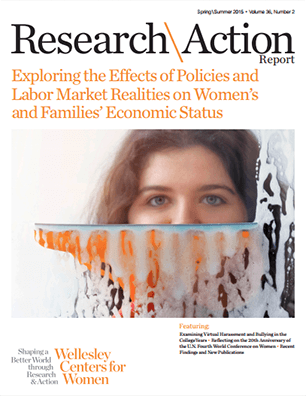Research & Action Report, Spring/Summer 2015
Sari Pekkala Kerr, Ph.D., arrived at the Wellesley Centers for Women (WCW) in 2010 as a deeply experienced senior researcher/micro economist. Her expertise and research accomplishments have significantly broadened the Centers’ reach into the economic implications of various government policies and marketplace realities, often with a particular focus on gender. As a micro economist, she typically studies the effects of such policies and realities on the lives of individuals, families, and children. She also brings to her work in the U.S. significant contributions from her continuing research of related issues in Europe, especially her native Finland. As a social democracy, that nation maintains a vast body of demographic statistics that has enabled her to study and quantify effects of various policies on millions of specific individuals. In some of her current work in the U.S., she seeks as far as possible to achieve an analogous breadth of scope.
Research & Action Report, Spring/Summer 2015
Virtual Harassment & Bullying in the College Years
Given the immense public attention on cyber bullying amongst teens and that social media is intricately tied to adolescent daily behavior, it’s not surprising that the vast majority of studies on cyber bullying are conducted on youth under 18. A recent review1 found that the highest incidence of cyber bullying in youth occurs during seventh and eighth grades—incidence that increases from elementary school, but decreases into the high school years. One might predict that since cyber bullying wanes in high school, that in college it would continue to wane. It was only until Pew’s recent study on online harassment in 2014—which demonstrated that the cyber harassment rate in young adults aged 18-24 can reach rates as high as 70 percent—that we can now see that young adulthood deserves more attention, academic inquiry, and public scrutiny.
Research & Action Report,Spring/Summer 2015
Remembering Beijing: Reflections on the 20th Anniversary of the Beijing Declaration / Platform for Action and CSW59
This year we commemorate the 20th anniversary of an important milestone in the history of the global women’s movement: The Beijing Declaration and Platform for Action (BPfA). The BPfA was the outcome document of the U.N. Fourth World Conference on Women, which took place in Beijing, China, in September, 1995, along with the parallel NGO Forum in Huairou, China. The U.N. Fourth World Conference on Women represented the culmination of two decades of international women’s mobilizations (in Mexico City, Copenhagen, and Nairobi) and announced the formation of a truly global women’s movement. The Beijing/Huairou events were attended by over 50,000 people. Thus, this 20th anniversary is an important time of both celebration and reflection, not only for those who attended the events, but also for all those who care about and work on the issues enshrined in the BPfA.
Research & Action Report, Spring/Summer 2015
Immigrant Entrepreneurship, Innovation, and Job Creation
Project Director: Sari Pekkala Kerr, Ph.D.
Funded by: National Science Foundation
This project examines the role of immigrant entrepreneurs in fostering innovation, creating jobs, and growing the U.S. economy. It identifies how skilled immigrants choose to start firms, what the effects are for overall U.S. innovation and employment, and which specific geographic areas and industries are most affected by the process. The results reveal entirely novel information that is of significant importance both for the public discussion on the impacts of immigration, as well as for actual science and innovation policy making and design of immigration programs.
Layli Maparyan, Ph.D., Katherine Stone Kaufmann ’67 Executive Director of the Wellesley Centers for Women (WCW) and Professor of Africana Studies at Wellesley College, engaged with diverse youth groups in Berlin, Germany in January 2015 to discuss the meaning of Black History Month and how it can cultivate social change leadership, not only in the U.S. but also around the world. Sponsored by the U.S. Embassy Berlin, the week-long tour offered Maparyan the opportunity to deliver a lecture, “Building Cultures of Inclusion Across Race, Ethnicity, and Religion: Comparing Notes Across the U.S. and Germany and Cultivating Social Change Leadership,” and engage in discussions with students and faculty of the John F. Kennedy Institute at the Free University; at University of Stuttgart; and at Freiburg University. Within the framework of the “womanism” praxis, Maparyan outlined non-oppositional problem-solving tools and illustrated how simple, personal acts can create amity and inclusion from the personal all the way up to the institutional level. In Bonn, Maparyan presented “A Womanist Perspective on Development” at the University of Bonn/ZEF, and “Building Cultures of Inclusion across Race, Ethnicity, and Religion: Comparing Notes across the U.S. and Germany and Cultivating Social Change Leadership” at Bonn University. Her trip concluded with Black History Month: A Storytelling Evening at Jugendkirche and a community meeting at the Anne Frank Educational Centre.
Page 1 of 2

In this issue:
 | Wellesley Centers for Women 781.283.2500 |
Copyright © 2025 Wellesley Centers for Women, Wellesley College | Privacy Policy
National SEED Project | National Institute on Out-of-School Time
